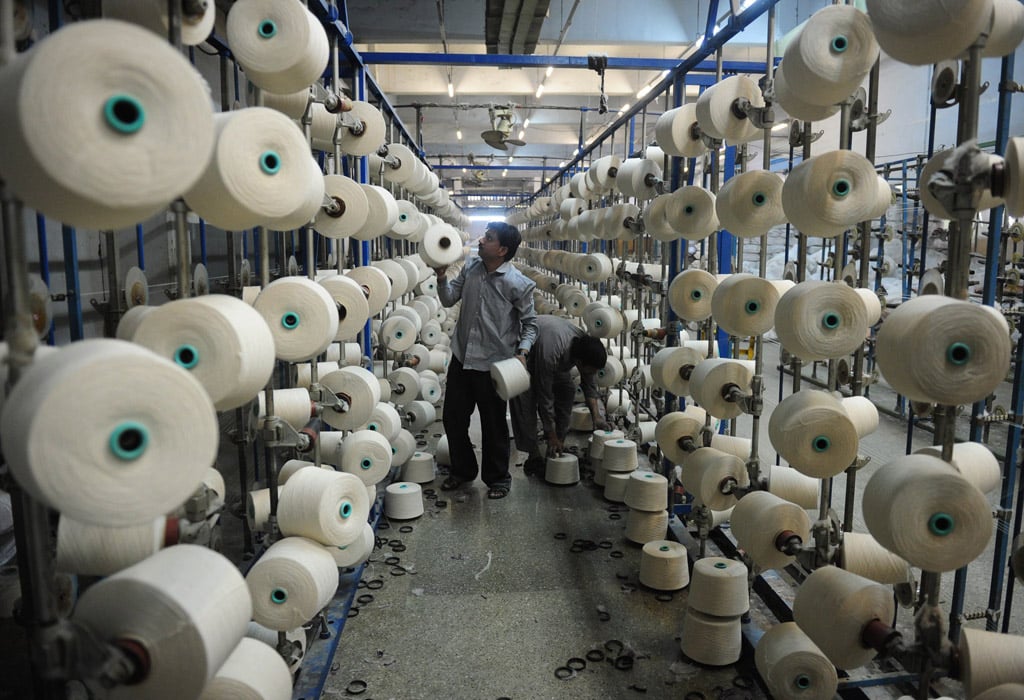
KARACHI: A devastating fire completely gutted his factory in 2012 and he lost almost everything overnight. But instead of leaving the business, he rented a factory and within 15 days he was supplying garments to his clients.
Today, the brand he started to develop about five years ago is recognisable more than ever, with loyal clients from Karachi to Kashmir and Gilgit-Baltistan.
This is the story of Shaikh Imtiaz Hanif, the CEO of Universal Corporation (UC), a garment factory in Karachi that specialises in knitwear garments.
Pakistani textiles take a hit, orders drop 50%
“The fire incident took away my factory and business, but not my experience in fabric making,” Hanif told The Express Tribune in an interview. “I thought the only thing that fire could not burn was my brain.
“I was devastated, but I soon realised I had to move on. People who used to do business with me offered me every kind of help from machines to raw materials on credit. With the help of a very close friend, I immediately shifted to another factory that had recently closed down.
“I still remember very well that upon receiving the first batch from my new factory, my clients were so surprised that they sniffed the garments to detect if there was any smell of fire in them,” he said on a lighter note.
Need of local brands
UC only supplies its knitwear in domestic markets. Hanif, who is associated with the textile business for over 40 years, is convinced that without developing their own brands Pakistani companies would continue to suffer in the current environment. But he also realises that developing a brand is a painstaking process.
“The time when the image of the brand is still nascent is one of the most difficult one in which you not only have to maintain quality but also show patience. You need to continuously innovate to transform a product into a strong brand,” he said.

“Despite opposition from retailers and against all odds, we have tried to focus on our own brand so that we can have our own identity. Now that we are in the market for five years, we are confident that we can enter into market with our own outlets,” said Hanif.
The company plans to open its first store in February next year as it believes it is now fully prepared to cater to the market.
‘Power loom sector on verge of destruction’
UC’s factory is in Karachi, but most of its products are sold in Punjab, the most populous and arguably the most prosperous province in the country. With up to 70% of sales in Punjab, the factory management believes purchasing power there is much higher than in Karachi and other parts of Pakistan.
“More people are now demanding better quality, especially in Punjab. When you provide them quality products, they can easily shell out Rs200-300 for a t-shirt,” he said.
The average retail price range of UC’s t-shirts is Rs500-700, but it goes up to Rs1,600. However, there are a few items of winter collection like jackets and pullovers that are sold in the range of Rs1,600-3,000, depending upon the retailer and location.
“Our target is middle-income groups, people who drive small cars and motorcycles,” said Hanif, when asked about his target market. “In knitwear products, there are products that are either too expensive or too cheap, leaving out middle-income segments who want to buy quality products but lack choices.”
Hanif believes that there is a massive potential for local companies to grab a significant market share in garments, but for that they have to improve their product quality and respond to market dynamics.
Online marketing still on periphery
Today, UC is present on every prominent online market site in the country, which gives it some edge over others. However, it’s not enough and it’s not working out.
Textile industry: Fresh investment has stopped with higher business cost
“There is a huge trust deficit in customers when it comes to the online garment business. With huge problems in providing right colours, sizes, issues in inventory management, I believe online garment business is the most difficult segment,” said UC Marketing Manager Ali Anwar.
“With online marketing, we are now reaching out to customers in areas even in far north of the country. There are no significant margins in online marketing; sometimes we have to sell products at a loss. Despite this, we want to expand our online presence because we believe this is an investment for the future. “We believe word of mouth is very important in our business and when you have a long term view you tend to stay in market anyway,” added Anwar.
The writer is a staff correspondent
Published in The Express Tribune, October 24th, 2016.
Like Business on Facebook, follow @TribuneBiz on Twitter to stay informed and join in the conversation.


































































COMMENTS (3)
Comments are moderated and generally will be posted if they are on-topic and not abusive.
For more information, please see our Comments FAQ